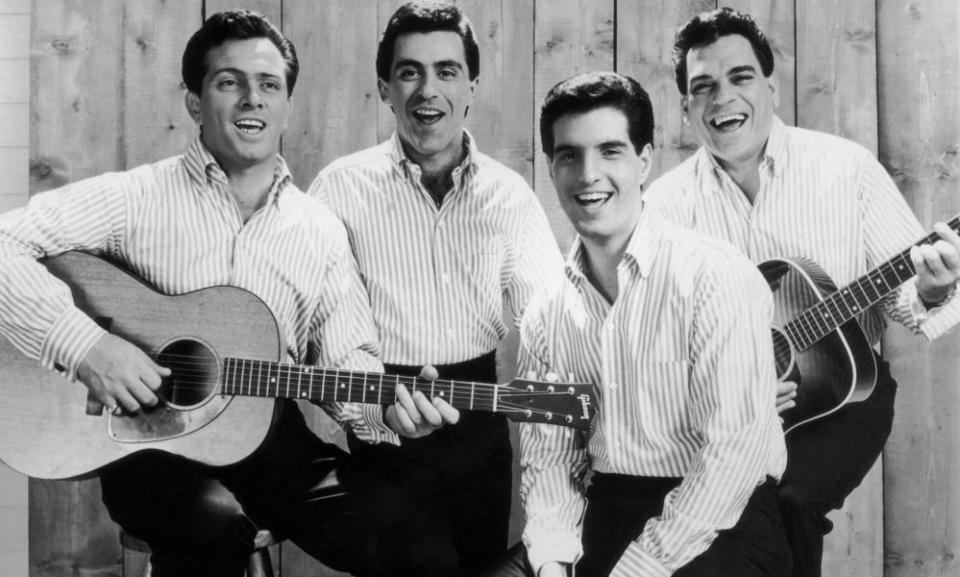Tommy DeVito obituary

As a founding member of the US vocal quartet the Four Seasons, Tommy DeVito, who has died aged 92n of Covid 19, made history by being in the first group to score three US No 1 hits in succession, with Sherry, Big Girls Don’t Cry and Walk Like a Man, in 1962 and 1963.
The Four Seasons were the biggest-selling American pop group of the early 1960s but little was known of their origins until the hit jukebox musical Jersey Boys opened on Broadway in 2005.
The show presented the band’s story through a four-part structure, with Tommy the first “season” to narrate a section. His character initiated audiences into the life of a working class boy in the New Jersey projects, where the young DeVito had bounced between prison and performances in local clubs. “If you’re from my neighbourhood, you’ve got three ways out – you could join the army, you could get mobbed up, or you could become a star.”
Jersey Boys was a worldwide hit, winning four Tony awards, running on Broadway for 12 years and in London’s West End for nine, and transformed the Four Seasons’ reputation and fanbase: discounted as “oldies”, they now found their music and history re-evaluated, and were embraced by listeners of all ages. The success of the show gave DeVito a comfortable income for the rest of his life.
He was born Gaetano DeVito, the son of Italian immigrants, in Belleville, New Jersey, the youngest of nine children. As a small child he picked up an older brother’s guitar and attempted to play it. This earned him a beating – and then awarning that he would get another beating “if he didn’t keep practising”.
By the time he was 12, DeVito was playing for tips in neighbourhood taverns and left school at 13. “When I was a kid, I was locked up. I was in six or seven jails. I went to prison one time,” he said in 2009. “I was a hell raiser ... a menace to everybody.” But he was also a gifted guitarist with a decent baritone voice and musical ambition, and in 1950 formed the Variety Trio, with local musicians, finding regular work in Belleville and Newark.
One of the group’s followers was 15-year-old Francesco Castelluccio, who had ambitions to sing. DeVito invited Castelluccio to join him in 1951 and the two worked together under a variety of band names for the rest of the decade – Castelluccio later changing his performing name to Frankie Valli.
Calling themselves the Four Lovers, they had a chart hit with You’re the Apple of My Eye in 1956 but subsequent recordings flopped. In 1958 they began working as session backing singers for the record producer Bob Crewe, and the following year were joined by the musician and songwriter Bob Gaudio and by Nick Massi on bass and bass vocals, and in 1960 the quartet renamed themselves the Four Seasons.
Their 1961 debut single, Bermuda, failed to make an impact but Sherry topped the US charts for five weeks in autumn 1962 (and reached number eight in the UK). With Gaudio’s songwriting, Crewe’s production and Valli’s powerhouse falsetto, the group created a distinctive Italian R&B sound that led to a series of classic singles. The critic Dave Marsh observed that “their songs carry … a potent sense of American class restrictions and carry their resentment of it … close to the edge of hysteria.”
The Four Seasons’ last US No 1 was Rag Doll in 1964: it was replaced at the top spot by the Beatles’ A Hard Day’s Night. While the popularity of “British invasion” bands overshadowed them, they remained in demand at home and abroad. Massi left the band in 1965 and DeVito followed in 1970. He claimed he was tired of touring but Valli and Crewe would state that they bought him out due to his money problems which were overshadowing the band, including gambling debts to a loan shark.

DeVito left his wife and two children in New Jersey to settle in Las Vegas, where he burned through the rest of his fortune in a year. “I blew everything partying,” he said. “Then I went to work as a dealer at the Sahara.” He soon had to clean houses for a living.
In 1990 the Four Seasons were inducted into the Rock’n’Roll Hall of Fame. The same year the actor Joe Pesci named his character in the Martin Scorsese film Goodfellas Tommy DeVito in honour of his lifelong friend. Pesci would help DeVito out over the years, landing him a small role in Scorsese’s 1995 Las Vegas mob film Casino.
Yet it was not until Crewe hired the writers Marshall Brickman and Rick Elice to shape a musical around the Four Seasons’ hits that DeVito gained any real attention. The pair interviewed Crewe and Valli then travelled to Las Vegas where DeVito stated, “don’t listen to those guys. I’ll tell you what really happened.”
In an interview in 2008 he said: “When you first see yourself being played, you look at the actor and say: ‘Do I look like that? Did I talk like that? Was I really a bad guy?’ And I was.”
DeVito was married twice; his second wife, Edda, predeceased him by three months. He is survived by two children from his first marriage and a daughter from his second.
• Tommy DeVito (Gaetano DeVito), singer and guitarist, born 19 June 1928; died 21 September 2020

